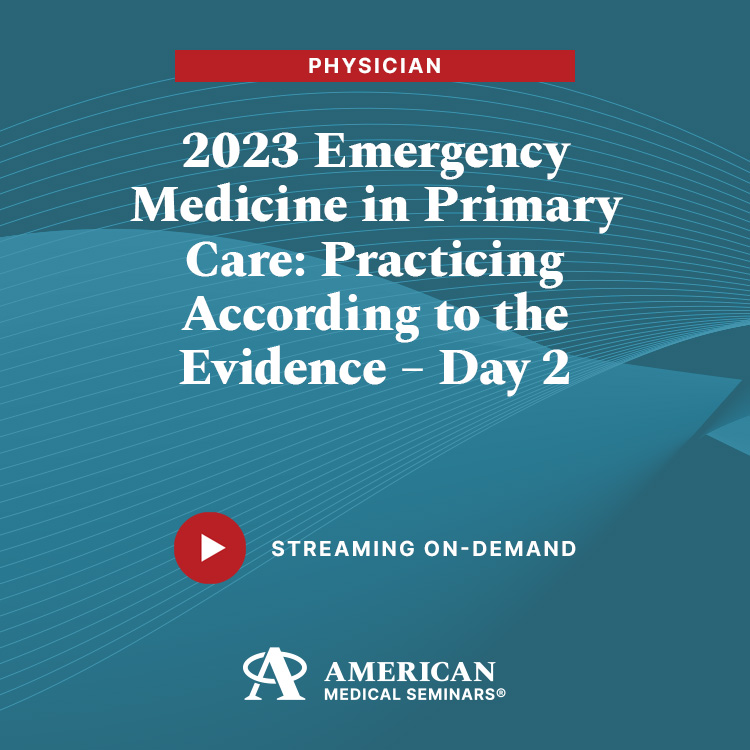Title: 2023 Emergency Medicine in Primary Care: Practicing According to the Evidence – Day 2 (Physician)
Faculty: Bryant Allen, M.D., F.A.C.E.P., F.A.A.E.M.; Andrew D. Perron, M.D., F.A.C.E.P., F.A.C.S.M.; and Michael E. Winters, M.D., M.B.A., F.A.C.E.P., F.A.A.E.M.
Release Date: 7/1/2023 Expiration Date: 7/1/2026
Day 2
GI Bleeds: Upper & Lower. (Allen)
Upon completion of this session, the participant should be able to: COMP,EBM
- Describe the gastrointestinal tract anatomy and pathophysiologic changes that result in presentation with bleeding.
- Determine the emergency department “essentials” for the assessment of the patient with GI bleeding.
- Develop a rational framework for the ED treatment of acute gastrointestinal bleeding, both upper and lower using evidence-based medicine.
Urogenital Emergencies: Torsion & Priapism. (Allen)
Upon completion of this session, the participant should be able to: COMP, GL
- Describe the anatomy, physiology and epidemiology of priapism and torsion.
- Discuss the evaluation and potential causes of both high and low flow priapism.
- Discuss ED management considerations and guidelines for the treatment of priapism.
- Describe the evaluation and bedside reduction technique for testicular torsion, including recent clinical decision tools and transfer recommendations.
Urogenital Emergencies: Ovarian Torsion & Tubo-ovarian Abscess (Allen)
Upon completion of this session, the participant should be able to: COMP,EBM
- Describe the anatomy, physiology and epidemiology of ovarian torsion and TOA.
- Discuss the diagnostic workup and imaging limitations in the evaluation of ovarian torsion.
- Discuss the classification and treatment of complicated pelvic inflammatory disease, including the updated CDC guidelines for treatment of these classifications.
Suboxone Treatment Out of the ED.
Addiction to opiates is a world-wide health care crisis. The emergency department is on the front line in this fight and emergency providers are more and more adding medically assisted treatment (MAT) to their list of things they have to offer this patient population.
Upon completion of this session, the participant should be able to: COMP
- Describe the extent of the opiate health care crisis
- Define what is involved in initiating a MAT program in your hospital
- Outline the steps that need to be followed when initiating a patient on MAT in the ED.
Adult Orthopedic Pearls and Pitfalls.
Orthopedic injuries are a frequently seen complaint in the Emergency Department. The vast majority are straightforward to diagnose and manage. There are some injuries, however, that are subtler in presentation and more complicated to manage. This session will focus on the latter group of injuries. Upon completion of this session, the participant should be able to: EBM, COMP
- Detect the presentation and diagnostic pitfalls associated with posterior shoulder dislocation.
- Determine an appropriate work-up of compartment syndrome and distinguish the myriad ways it can present.
- Appraise those at risk for knee dislocation and relate the time-imperative for reduction.
- Demonstrate understanding of the work-up and evidence-based treatment for native hip dislocation, as well as occult hip fracture.
- The receipt for any incentive-associated purchase will designate the value of the gift card separately from the cost of the learning activity.
- This incentive may have implications on your tax reporting obligations. Any reimbursed amount must be declared as personal income for tax purposes.

